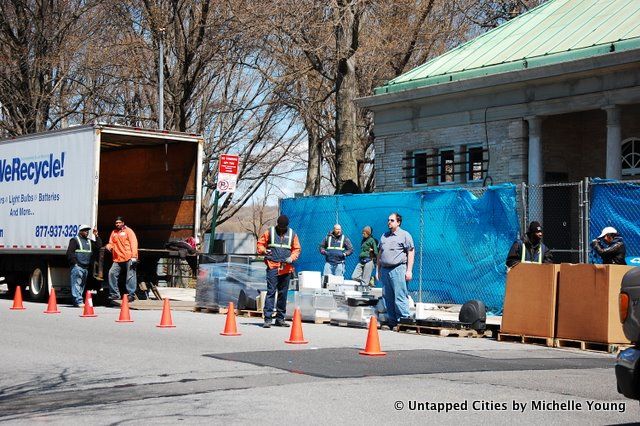Last Chance: The Annual Orchid Show Soars at the New York Botanical Garden
The vibrant colors of Mexico come to NYC for a unique Orchid Show at NYBG!


An e-waste collection event by Lower East Side Ecology Center
Despite a series of electronic waste laws in New York State, dating back to 2007, most residents are still pretty confused as to how to dispose of their old computers, cell phones and cameras. Fortunately, Untapped Cities founder Michelle Young wrote a 80-page thesis on the challenges of e-waste recycling in the city, which we will distill into a short, usable guide.
Summary of the Laws
On January 1, 2015, residents of New York City will no longer be able dispose of electronics like computers and TVs in the waste stream. Resa Domino of We Recycle! believes that the residential disposal ban is a “backstop,” and states that a residential ban is already de facto in place since January 2012 as “private haulers are not supposed to pick up electronics for recycling even though technically residents can put it out.”
On the consumer end in New York City currently, the process to recycle electronic waste is non-systematic and ad-hoc. However, New York City is unique due to the large number of non-profit and community organizations that are actively involved in electronic waste collection.
Where can I recycle my electronics?
The New York State electronic waste legislation mandates for “convenient” collection at no cost to consumers. Although there are numerous for-profit companies in New York City that handle electronic waste (sometimes coupling data destruction), only a few are recommended on New York City government’s NYCWasteLess website.
Retailers
The easiest way to recycle is to take your electronics to a retailer like Best Buy, Staples, J&R, Office Depot et al.The New York State Electronic Equipment Recycling and Reuse Act requires manufacturers of electronic equipment and retailers to accept back items for collection, handling and recycling.
For cell phones, the New York State Wireless Recycling Act requires all wireless phone service providers, like Verizon and AT&T, to accept up to ten old phones for recycling or reuse. The New York State Rechargeable Battery Recycling Law requires manufacturers of covered rechargeable batteries to collect and recycle batteries at no cost to consumers. Apple has an online recycling program that’s simple to use–fill out info about your device and they ship you a ready to pack box. You’ll get a gift card based on the value of your item.
In addition, many manufacturers have partnership with specific retailers. Hewlett Packard works with Staples, offering free collection for any brand device (up to 6 items per day per person)
Non-Profits
Organizations like Goodwill and Salvation Army also take back electronics for recycling in partnership with a large consortium of electronic companies like Dell, Panasonic, Sharp and Toshiba.
The high-profile Lower East Side Ecology Center has operated regular city-wide community collection events since 2003 and opened a permanent collection facility in Gowanus, Brooklyn in February 2012. The LES Ecology Center works with WeRecycle!, a for-profit NYC-based recycling company for the processing of the collected electronics.
Sony’s Takeback Recycling program partners with non-profits in New York City such as Per Scholas, the Pencil Program, the Robin Hood Foundation.
In Brooklyn Heights, the First Unitarian Church hosts an annual e-waste collection involving a collective of organizations including the Brooklyn Heights Association, Brooklyn Heights churches, and local institutions. Part of the electronic waste collection goes towards New Jersey-based non-profit, Urban Renewal Corporation, which delivers medical and social services to the homeless and disadvantaged population in Newark.
City Events
Each spring, the city of New York hosts DSNY SAFE Disposal events for each borough. SAFE stands for Solvents, Automative, Flammables and Electronics which give you an idea of the harmful household products collected at this events, more complete list here.
At Home/Business Pickups
For those interested in at-home pick-ups, The 4th Bin specializes in door-to-door pickups from residents and businesses, for a “simple and inexpensive” way to recycle and reuse. The company was founded in 2009, a year after the original New York City electronic waste legislation was passed. Its mission is to be an “ethical e-waste rescue solution dedicated to e-Steward certified recycling standards.
Companies like The 4th Bin, who work with recyclers adhering to the highest ethical standards available, such as e-Stewards and R2 recyclers, make their margins on pickups rather than on the recycling of goods:
The city itself also has a program e-cycleNYC, through which apartment buildings larger than 10 units can sign up to get free and convenient service to pick up and recycle unwanted electronics. Given the lawsuits against a 2008 NYC e-waste law that required door-to-door pickup, most industry players were dubious about the city actually implementing something like e-cycleNYC (Bloomberg himself vetoed it based on a required quota). Nonetheless, the program was announced in May 2013.
On a policy level, the main problem of the residential disposal ban is that, unlike some state electronic waste bills, the New York State law does not specify in any level of detail how the residential ban should be implemented at the local level. It also doesn’t require local municipalities to bear any onus for collection or public education. The New York State law puts sole responsibility on the manufacturers to handle the collection and recycling or reuse of electronic waste, along with financing and implementing a campaign for public education. Fortunately, the city of New York has taken some clear steps in the right direction, with the SAFE Disposal events and e-cycleNYC. We’d love to see a map or app of locations to easily find e-waste drop off locations nearby.
For more detailed information regarding e-waste recycling (what happens after the electronics are collected) and how community-based approaches can be harnessed to support the shortcomings of the New York State e-waste law, read Michelle Young’s thesis here. Also see our previous look at a collection event with the Lower East Side Ecology Center.
Subscribe to our newsletter